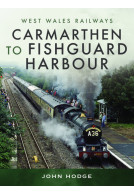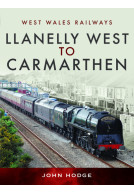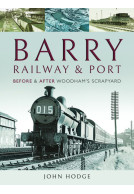Whitland to Pembroke Dock (Hardback)
Imprint: Pen & Sword Transport
Series: West Wales Railways
Pages: 128
Illustrations: 27 colour & 270 black and white illustrations
ISBN: 9781399095723
Published: 1st April 2022
(click here for international delivery rates)
Order within the next 1 hour, 55 minutes to get your order processed the next working day!
Need a currency converter? Check XE.com for live rates
Whitland to Pembroke Dock is the latest book in the West Wales Railways series which continues the previous South Wales Main Line series covering the line from the Severn Tunnel through to ends of the main line in West Wales. This volume covers the section from Whitland to Pembroke Dock, a largely agricultural and holiday line, centring on Tenby and Pembroke. The line was worked by Whitland depot which was a steam sub-shed of Neyland, with its own allocation, mainly of tank engines. These worked the Cardigan and Pembroke Dock branches until the former was closed under the Beeching closures of the mid-1960s, when the engine shed was closed under dieselisation in 1964. The volume of freight traffic was radically affected by the withdrawal of goods sundries and parcels traffic, but especially by the withdrawal of wagon load freight traffic in 1976, which had brought much Animal Feed and Farming traffic to the line. Like much of South Wales, the traffic is now purely passenger with DMUs though Summer Saturdays still sees a through train now with IETs to and from Paddington, carrying on the service from HSTs. The previous Pembroke Coast Express in steam and early diesel days was the prime train on the branch running to and from Paddington and is still reproduced in the modern preserved steam special workings.
As featured by
Broad Gauge Society
John Hodge’s latest book on the railways of southern Wales is devoted to the line from Whitland to Pembroke Dock. One further volume in the series is promised on the line to Milford Haven and Neyland, but it seems that the Cardigan branch will not be covered, at least in this series.
West Somerset Railway Association
In what is essentially a well-captioned picture album with narrative introductions to each location, the present work provides a further fine selection of trains and the infrastructure of the railway which gave the line so much of its character. As well as premium trains such as the Manor-hauled ‘Pembroke Coast Express’, we see local trains hauled by the GWR’s tank and smaller tender locomotives, and there is plenty of evidence of the freight and parcels traffic now lost from this line.
The images cover the period from the earliest days (including a Bulldog 4-4-0 and another of a steam railmotor at Lamphey) to more recent colour views of the HSTs and IETs which now provide a through service to Paddington. A number of steam and diesel-hauled excursion trains is featured, but the majority of the book is taken up with images from the 1960s, several of which are by well-known photographers.
For modellers, there is an excellent selection of views showing station infrastructure such as buildings, watering facilities and footbridges, and these extend from the generous facilities provided at Tenby and Pembroke Dock to the rudimentary platform provided at Beavers Hill Halt.
The book is generally well presented and many of the pictures merit detailed study, one revealing for instance that engine 5603 wore ‘British Railways’ in Gill Sans lettering on its tanks in 1949. Although lacking in appendices, the book does contain a useful summary of Whitland Shed’s locomotive allocation by decade from 1900 to 1960.
This book is well recommended and is sure to find a place on the shelves of those with a love of the railways in this frequently overlooked corner of the Western Region, as well as those who have purchased John Hodge’s other works.
This volume in the West Wales Railways series from John Hodge covers the line in the title which also serves the holiday resort of Tenby. In steam days it was worked by engines from a shed at Whitland which, although it housed as many as 19 locomotives, was a sub-shed of Neyland. The branch is now a wholly passenger operation, goods traffic having ceased by 1976. The daily Pembroke Coast Express provided a through service from Paddington.
Railway and Canal Historical Society
As with other books in the series this is largely a collection of photographs depicting all the stations and halts on the line. There are a few early shots but mostly the illustrations are from the post-Nationalisation period with the colour photographs being very recent. There is a brief chapter on the history of the line and another section on the engine shed at Whitland which includes locomotive allocations for a range of dates.
A largely pictorial volume about this overlooked line through Pembrokeshire.
The Journal of the Friends of the National Railway Museum - Summer 2022, Issue 180
For lovers of Welsh railways this will be an interesting reed.
The volume is the latest in John Hodge's series of books in the West Wales Railways series and it provides a full description of the still operating branch from Whitland, where it leaves the main line, to Pembroke Dock. The book details the route and intermediate stations, including maps, fully backed by images from the author and a wide range of others. I liked this book.
The Railway Correspondence and Travel Society, The Railway Observer - August 2022
This is a book full of nostalgia for lovers of GWR branch lines. The author has managed to leave the reader feeling that they have experienced the Whitland to Pembroke Dock branch, even if they have not travelled on it. Highly recommended.
Rail Advert
Read the full review here
John Hodge continues his series on West Wales Railways with the latest volume, this time, the line from Whitland to Pembroke Dock. As with other volumes in the series there is a logical layout of an introduction accompanied by an excellent map of the line.
6024 Preservation Society
There then follows a ‘Location analysis’ station by station down the line to journeys end at Pembroke Dock. Each one has a brief history which includes layout changes.
The accompanying photographs major on the classic ‘Front three-quarter’ shot loved by photographers, although there are at times station views which are ideal for modellers.
Again an interesting volume and I look forward to reviewing the final volume to Milford Haven & branches to see how it is produced.
Featured in
Welsh Railways Research Circle Newsletter, No.169 Spring 2022
As featured in
The Bookseller
Another great book from the author.
James Simmonds
A detailed history of the branch. Contains some great photos including many in colour. Including to the present day.
I would recommend
About John Hodge
The late John Hodge was a former railwayman, who started his working life on the Western Region in South Wales in 1961, later transferring to London Paddington and British Railways Board. He was brought up in Barry, a port town west of Cardiff, which has strong railway connections, once being an important port for coal traffic and later being famous for Woodham Brothers scrap yard, and which held over 200 locomotives that are now mostly preserved on heritage lines. John was a lifelong railway enthusiast and historian, with many railway histories published.























